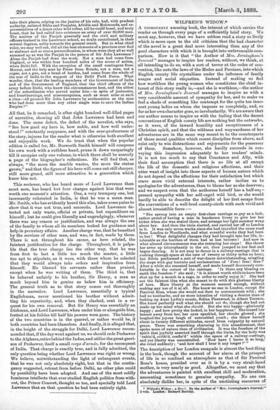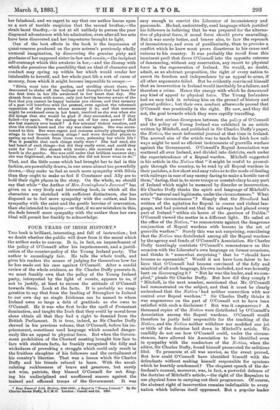WILFRED'S WIDOW.*
A THOROUGHLY amusing book, the interest of which carries the reader on through every page of a sufficiently brief story. We must say, however, that we have seldom read a story so lively
which is more open to the old criticism that the bad character of the novel is a great deal more interesting than any of the good characters with which it is brought into unfavourable com-
parison. How is it that " the Author of Mrs. jerningham"s Journal" manages to inspire her readers, without, we think, at all intending to do so, with a sort of terror at the codes of con,-
vention, like unto the laws of the Medes and Persians, into which English county life crystallises under the influence of family usages and social etiquettes. Instead of making us feel how worthless the young woman who constitutes the chief in- terest of this story really is,—and she is worthless,—the author
of Mrs. Terninghanes Journal manages to inspire us with a very considerable amount of sympathy for her, and to make us feel a shade of something like contempt for the quite too inno- cent young ladies on whom she imposes so completely, and, so
far as her own character goes, so involuntarily. We are aware that our author means to inspire us with the feeling that the decent conventions of English county life are nothing but the outworks, as it were, of the inward humility and receptiveness of a Christian spirit, and that the wildness and waywardness of her adventuress are in the same way meant to be the counterparts of those moral qualities which resent discipline from above, and exist only to win distractions and enjoyments for the possessor of them. Somehow, however, she hardly succeeds in con- veying this impression adequately to her readers' minds. It is not too much to say that Constance and Ally, with their final assumption that there is no life at all except the life of the domestic and religious affections, and their utter want of insight into those aspects of human nature which do not depend on the affections for their satisfaction but which crave more vivid external interests, rather incline us to apologise for the adventuress, than to blame her as she deserves; and we suspect even that the authoress herself has a half-sup- pressed sympathy with her self-caged wild bird, or she would hardly be able to describe the delight of her first escape from the conventions of a well-bred county-circle with such vivid and almost irresistible force :-
" She sprang into an empty first-class carriage as gay as a lark, rather proud of having a man in handsome livery to give her her ticket when she was seated there, and arrange her light summer wrap about her. And then the train started, and carried her off to London in it. It was only seven weeks since she had travelled the same road from London to Woodlands, and what eventful weeks they had been to her ! What delightful Changes they had brought into her life, in- tolerable as the burthen of them had at last become ! And now in what altered circumstances was she retracing her steps ! She threw her arms up triumphantly in the air, then jumped to her feet and began dancing. It is not easy to dance in a railway-carriage that is rushing through space at the rate of twenty or thirty miles an hoar; but Silvia performed a sort of war-dance notwithstanding, mingling the steps with gay hurrahs and exclamations of Free ! free ! free r After a while she reseated herself, and made herself decorously com- fortable in the corner of the carriage. Is there any blessing on earth like freedom ?' she said ; it is almost worth while to have been shut up for a month in a cage, in order to really enjoy it.' She had not the faintest idea what she meant to do with this glorious liberty of hers. Mere liberty at the moment seemed enough, without making any use of it at all. She knew no one in London, except Sir Percival Ross, whom she would not dare to communicate with ; she had no toothache, and no more intention of visiting a dentist than of looking up Aunt Lydia's cousin, Selina Fleetwood, in Albert Terrace. She knew perfectly well what she should not 'do, though she had not made up her mind what she should. But she was happy—gloriously happy ; and how pretty she looked, in her happiness ! She tossed her bonnet away from her, her eyes sparkled, her cheeks glowed ; she laughed the joyous laugh of untroubled youth; she threw herself about in twenty different attitudes, saved from vulgarity by natural grace. There was something charming in this abandonment, that spoke more of nature than of civilisation. It was the freedom of the spirit that joyfully asserted itself through the limbs, for the body was cabin'd, cribb'd, oonfin'd ' within the space of a railway-carriage,
and yet liberty was uncontrolled. How have I borne it so long, she cried suddenly; and how shall I bear it any longer ?"
The description of her London escapade is almost the best thing in the book, though the account of her alarm at the prospect of life in so confined an atmosphere as that of Sir Percival Ross's house, presided over as it is by a very strait-laced mother, is very nearly as good. Altogether, we mast say that the adventuress is painted with excellent skill and moderation, amounting sometimes to genuine sympathy. No one can absolutely dislike her, in spite of the unstinting resources of
• WWrod'o Widow : a Nov' 1. By the Author of " Mrs. Jerningbanis Journal:' 2 vole. London : Richard Bentley, her falsehood, and we regret to say that our author leaves upon us a sort of terrible suspicion that the second brother,—the strait-laced Geoffry,—is not at all unlikely to pursue the poor disgraced adventuress with his admiration, even after all her arts
have been discovered and her impostures brought to light.
One of the best effects in the book is the impression of quasi-remorse produced on the poor actress's previously wholly unmoral imagination, by discovering the genuine piety and goodness of her supposed sister-in-law and cousin,—the incipient self-contempt which this awakens in her,—and the dismay with which she perceives the possibility that an ideal of character and conduct may spring up within her which would render her intolerable to herself, and her whole past life a sort of curse of memory, from which it might become impossible to escape :— " Silvia went into the garden, and strolling about there, en- deavoured to shake off the feelings and thoughts that had been for the first time in her life awakened in her heart that day. She shrank from them with terror, only just having become aware of the fact that you cannot be happy because you choose, and that memory of a past will interfere with the present, even against the vehement opposition of the person whose memory it is ; and that remorse might be awakened even in her heart, resolved as she was when she did things that she would be glad if they saoceeded, and if they failed—try again. Was she passing out of her own power Had she lost mastery over herself ? A few minutes' violent emotion, and then the clouds burst and the sky was clear again. She was accus- tomed to this. But were regret and remorse actually planting their stings in her breast—lasting stings ? and were dreadful plants to spring up and flourish from these roots, poisoning her whole life ? Was it possible that such things really were ? She had read, she had heard of such things—but did they really exist, and could they exist for her ? She shrank with terror; she cowered down on a bench in the garden. She was cold under that brilliant summer sky; she was frightened, she was helpless, she did not know what to do."
That, and the little scene which had brought her to feel in this fashion, are powerfully drawn, in one sense almost too powerfully drawn,—they make us feel so much more sympathy with Silvia
than they ought to make us feel if Constance and Ally are to hold their right places in the story. On the whole, we should say that while " the Author of Mrs. Jerninghane Journal" has given us a very lively and interesting book, in which all the characters are sketched with sufficient distinctness, she has disposed us to feel more sympathy with the outlaw, and less
sympathy with the saint and the gentle heroine of convention, than she intended to inspire ; —or that, if we are mistaken in this, she feels herself more sympathy with the outlaw than her own ideal will permit her frankly to acknowledge.



































 Previous page
Previous page